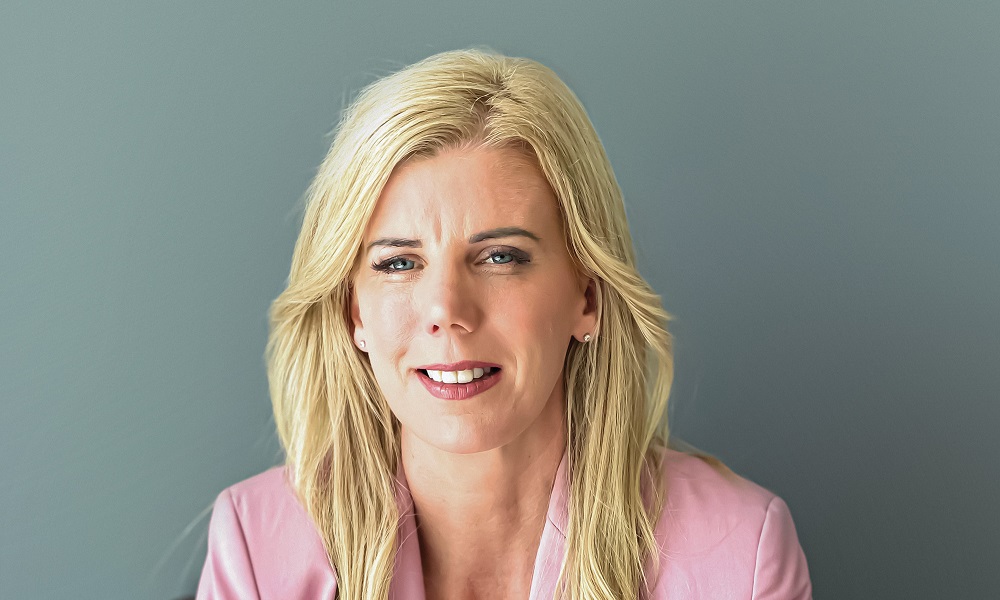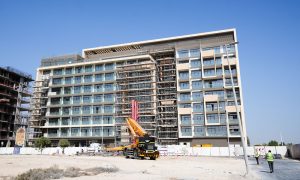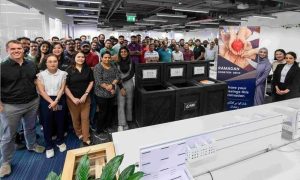WiC: JLL MENA’s Louise Collins interview
Louise Collins, head of engineering & energy, JLL MENA tells her peers to be bold, be brave and work hard

Following our special edition dedicated to women in the construction industry, Middle East Consultant continues to share the inspiration and experiences of women working in the male-dominated industry across the GCC. Here, we catch up with Louise Collins, head of engineering & energy, JLL MENA.
What drove you to get into construction and your very first role in the industry? What were some of the influences that set you on your path?
Like most teenagers I had no idea what I wanted to do, and my older brother suggested that as my favorite subject was math, and competing with my male counterparts, that engineering might be a good path for me. I honestly had no idea what I was getting myself into until my first day of university arrived, with at a large auditorium of 200 guys and 3 girls.
I was lucky enough to get a couple of summer internships with a contractor on site during my summer breaks from university, which were baptisms of fire and helped me breakdown any notion of being treated differently in our industry with an old school ‘one of the lads’ approach.
Share a brief about your career, mentioning key achievements with regards to your role.
After working as a graduate and engineer for four years in Ireland and the UK, I then relocated to Dubai in 2004, as a senior engineer for international firm WSP. The jump from medium size to large corporations was exciting as Dubai was just at its infancy in terms of construction and development. The move to Dubai during this time opened a lot of doors in terms of projects and general opportunities. This was the first time I really got to work on large-scale projects and programs and had a team under my remit. I spent the next five years really developing my technical and team skills within several big companies growing quickly from a senior engineer to the youngest associate Ramboll have ever had in their business aged 28.
When my Ramboll Middle East managing partner decided to set up his own company in 2011, he asked me to join him which was a phenomenal opportunity. The role gave me an opportunity to help build a company from scratch. This included financial, technical, resourcing, marketing, contracts, and everything else that I soon found out goes into a running a company. I became very aware during this time of the impact my role had with regards to two of my favorite subjects’ diversity and sustainability, and how I can positively influence these issues in my role.
I began to build these pillars into our company DNA, setting them as KPIs throughout the business and regularly speaking about them at conferences. During my nine-year tenure in the business, we not only grew the business from three to 350 people, we opened offices in Singapore, India, Saudi Arabia, and London.
In 2021, during the pandemic, I really started to look at myself and where I wanted to be in the next 10 years, as I wanted to make an even bigger impact in my role. I started at JLL in December of 2020, as head of engineering & energy, with a remit to start a new work stream within their current middle East business, whilst being supported at a corporate level, which was ideal. I’m currently learning the ropes of a big corporate fortune 500 company, whilst staying grounded by the small company ethos I learned over the last 10 years. I am very ambitious, and I like the huge room for growth of an international company – it’s certainly different to work with a company with such a big reach, with the ability to really influence markets, clients and people, and I’m hoping I can align my passions to realise some big positive outcomes.
Besides fairness and being the right thing to do, diversity in the construction industry is important because of the value women can bring to employers, clients, and customers. How have you made your mark in the industry working on projects and what is your proudest moment?
Having diversity in the construction industry not only gives new perspectives, but it also enhances creativity and productivity. A Mckinsey & Co. 2019 analysis found that companies in the top quartile for gender diversity on executive teams were 25% more likely to have above-average profitability than companies in the fourth quartile—up from 21% in 2017 and 15% in 2014.
Studies on how women-led businesses perform around the world have been reaching a positive consensus too. In 2016, the Credit Suisse Research Institute issued its updated report on women leaders and company performance at partners around the world, the Credit Suisse 3000. According to the company, the results demonstrate that the higher the percentage of women in top management, the greater the excess returns for shareholders.
What are some of the barriers to women entering the construction industry? What was your personal experience?
The first barrier is aesthetic, I was literally the only woman in most meetings I participated in for the first 10 years of my career. No matter how confident you are, this is intimidating been a minority in any circumstance. The only way to change this is bring more women in, otherwise there will be some women that we will never be attracted into our industry.
The second for me personally is family, although socially men and women play very equal roles in raising kids, the guilt as a mum between your commitment to work, upskilling and family is very hard to balance. I missed my daughters first day of school traveling for work and I also remember being 36 weeks pregnant with my son in Riyadh for a presentation. It’s not easy trying to find the balance, so you need to have a great support system around you and work for a company that allows you flexibility when needed. A survey by Boston Universities economist Andrew Newman showed dual career couples are 25% less likely to get divorced; so hopefully my career efforts aren’t all to the detriment of family.
A staggering statistic that haunts me is that 29% of women see their gender as a disadvantage, this is a huge barrier to the success of any positive influence. We need to change and influence this with the facts that companies with more women in them are more successful, and as such it’s a huge advantage to all of us.
The GCC construction sector is still male dominated, however diversity is beginning to increase. If you agree with this, comment on what is driving this and how you see the GCC markets changing in the coming years? If you do not agree with the earlier statement, please share your thoughts/views of the market.
I do agree, I sometimes get frustrated that we are still talking about gender diversity when other parts of the world are focused on non-gender related diversity which is now becoming crucial.
In 1999, when I started my first internship, people were saying ‘oh a girl engineer’ and it’s sad that we are now 22 years on and I still get the same ‘oh you’re an engineer’. It’s perplexing and we need to move on and change the external perception that this is a male industry because factually it’s not anymore, albeit lower numbers are recorded in raw construction, like engineering and construction management. Generally, the numbers are rising on a massive trajectory. We need women that are in the industry to be more visible as this will encourage more women into the industry.
Everyone has a part to play in diversity and equal pay. What would you like to see government authorities and construction firms do to increase diversity and make pay a level playing field?
It’s hard to implement hard and fast measure on companies anywhere in the world and we need to remember a lot of GCC countries are still emerging markets. There is currently no minimum wage legislation in general, so implementing equal pay legislation in this region has some way to go.
Equal pay in the companies that I have worked with has also been based on gradings; this is a simple mechanism of paying people for their abilities and experience. If someone has made it to associate level because they have all the qualifications – communication, technical, client relationships etc, then they earn the equivalent pay grade.
Good companies will benchmark salaries with their competitors, good recruiters will ensure the people they put forward get the right salary and good candidates will ensure they are paid what they deserve. Everyone must pay fair, and everyone deserves to be paid fairly.
As a woman in the industry, what has your experience been working in the GCC construction sector? If you have worked in markets outside the GCC, how does your experience here compare with what you’ve experienced and observed in other markets?
The GCC construction industry is dynamic; I worked in Europe many years ago and I guess things have changed a lot since then but I really think the opportunities are phenomenal here. I went from designing two storey buildings in the UK to 80 storey towers in Dubai. I’ve worked on some of the best projects in the world from water and snow parks to working with some of the best architectural teams like Calatrava, Zaha-Hadid and Killa Design.
The technology and innovation here are evolving faster than most regions and the opportunities are endless. It’s such a melting pot of people and talent and every day is vastly different and I learn something almost every day, which is staggering after this length in the industry.
In your opinion, what is the biggest challenge women in the construction sector face in GCC countries? How can these challenges be addressed?
Pipeline is definitely the issue, and this is not exclusive to this region although it is probably exaggerated here by the sheer volume of men. We are not getting enough women coming out of universities; we are not keeping them in the industry and women are not pushing themselves to the C-Suite of board level enough. Hariot Watt have only 15% female scholars in engineering & construction management, yet 77% in architecture. Overall, 25% of females are finishing university and not entering their perspective industries. So, for me the three big objectives are: bring more women in; keep them in; and push them up to leadership roles.
In 2019, I and a number of female directors in construction canvased a number of local schools: primary, secondary and university. When we asked the primary school kids to draw an engineer – they all drew men. When we asked the secondary school to name a female engineer, only one named Gwynne Shotwell.
By the time we got to university, the engineering classroom only had six ladies. We also asked them what they thought women in construction would do; most of them thought it was desktop work doing calculations. When we explained to them all of the different elements of engineering and how dynamic it was, they were surprised. They started to become interested and asked about the innovation and technology, what type of clients we worked with, how much did we get to travel etc. The perception of what we do is also key to enticing more women into construction.
In doing your job, what sort of discrimination (if any) have you faced and how did you/employer address it?
I have been extremely lucky throughout my career that I have never experiences any negative impact for being female. If anything, it has helped me: it’s much easier to remember the Irish lady in the room than the 20 men in suits, and client do remember you for that reason, so using that as a platform to demonstrate ability has been a bonus.
All my mentors and managers have been strong men and have had very few female role models unfortunately – not because of bad women because there just weren’t many around. This is something that is key to pushing diversity – having more women visibly as role models to aspire to.
One female in our industry once questioned me on hiring women because of maternity leave issues, and lets face it, this is the elephant in the room – peoples’ perception that if they hire women, they won’t get as much out of them as they do men. However, people who measure output as time alone don’t understand the real value of talent.
Do you feel there’s a limit with regards to how far you can progress within your respective organisation?
No, absolutely not, because of the demand for diversity and the limited number of women in the industry, I have a great opportunity to charge to the top and make a real impact in our industry. I work for someone who is constantly looking for more women in the team. Companies including JLL are/have set up governance at leadership, management and board levels for diversity, so the doors are wide open in this respect.
How does the firm your currently work for approach diversity in the workplace? What more can your firm do to increase diversity?
JLL is a global leader in diversity and one of the reasons I was drawn to it. We are 25% female in the region and 35% globally. 29% percent of the leadership team are also woman. But, the important thing about driving these statistics up is based on a backbone of meritocracy, it’s important that we don’t just promote for the sake of diversity. There is a huge push to upskill women when we find the right candidates and keep them in the business. We do have women in leadership and women internship programs, which are set up for this exact reason and have helped JLL create a huge diversity talent pool.
How do you personally push for diversity and equal pay in the construction sector? Are you involved in any groups/councils etc. that focus on increasing diversity and equal pay?
I’ve been very lucky to have worked for companies that do not discriminate and I’ve always been measured on my own successes. I do like when companies benchmark salaries in industry against roles and ability. I try to act as a role model in what I do and I’m a huge advocator for the right women in the industry.
I like to focus on pipeline and mentoring and working with some of the local schools and universities to bring more women through into construction. I always have a number of mentees and interns that I support long term. WIBSE, DBWC, Aurora50, Wild and other platforms are doing an amazing job of helping women in the industry reach their goals.
What advice would you give to a woman entering the GCC construction industry today?
Be bold, be brave, work hard, work for people and companies that respect you and push you forward. Don’t be afraid to say: ‘I want that promotion’ or ‘I will take on the role’ or ‘What do I need to get to the next level’. It’s not arrogance, its confidence.
Ensure you are constantly upskilling, as it’s a competitive and dynamic industry. The Middle East is still developing at a rapid pace and the opportunities around you are unlimited. Enjoy what you do, be kind to those around you and never stop learning.
Please share any interesting stats/reports you’ve come across with regards to diversity in the construction sector.
Women compromise only 10.3% of the construction industry. 87% of interior designers are women. 30% of project managers are women. In 2019 the NAAB annual reported 49% of architectural student intake, up 30% from 2000 intake numbers, so the tide is turning.
Only 3% of boards in the ME have women on them. This number is growing at a phenomenal rate thanks to corporate and government initiatives. Networks like Aurora50 and DBWC and other like this are really helping tackle this gap at C-suite level.
One of my the funniest yet most worrying facts around diversity was published in relation to the UK in 2019 – there were more FTSE 100 CEOs named Peter than women CEOs. When I explained this to my daughter, she was confused but adamant that when she got older, there will be more Daisys and Fatimas than Peters, so the goals have been set in our house!























